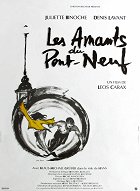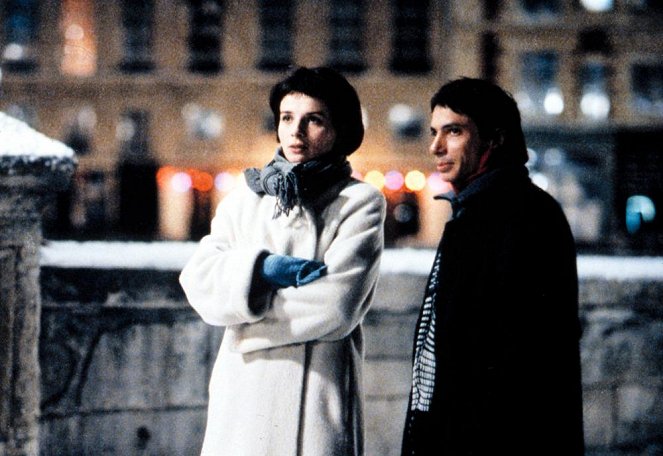Rendező:
Leos CaraxForgatókönyvíró:
Leos CaraxOperatőr:
Jean-Yves EscoffierSzereplők:
Juliette Binoche, Denis Lavant, Edith Scob, Marie Trintignant, Marion Stalens, Michel Vandestien, Jean-Louis AirolaTartalmak(1)
Alex fiatal, párizsi hajléktalan a Pont-Neuf hídon szokta meghúzni magát. Egyik reggel egy fiatal nővel ismerkedik meg a hídon. Michčle, a fiatal festőnő attól fél, hogy mindkét szemére megvakul, és nem tudja gyakorolni a hivatását, ezért menekül el rendezett polgári életéből. A két fiatal szenvedélyesen egymásba szeret, és extatikus perceket él át a forradalom 200. évfordulóját ünneplő Párizsban. Alex annyira fél, hogy elveszíti a lányt, hogy minden nyomot elpusztít, ami arra utalhat, hogy a szembetegsége gyógyítható. Így akaratlanul egy plakátragasztót is megöl. Alex börtönbe kerül, Michčle szemét megoperálják. Évek múlva újra találkoznak a karácsonyi pompájában ragyogó hídon, alattuk úszik az Atalante nevű uszály… (Örökmozgó)
(több)Videók (1)
Recenziók (1)
In the opening minutes, it feels like a very raw, unfiltered ride through the underground of a city, a road movie among alcohol-soaked human wrecks, impoverished homeless people, and desperate individuals who survive from day to day. I expected to see a strong realistic social study of people on the outskirts of the system or completely beyond its reach. However, the meager existence named Carax quickly veers toward the shining neon lights, which create a contrast with the filthy homeless people, and the viewer's gaze slides towards the rocket geysers fired during the generously conceived city celebrations. Among their reflections on the surface of the Seine, Carax's characters zigzag while water skiing. Good Lord, what does this have to do with the life reality of Parisian homeless people?! Even those at the bottom of the social ladder are entitled to love and undoubtedly experience it, but it is much harsher. In their world, there is no room for melodrama and beautifully shot poetic images. Carax envisions the love of his characters from a middle-class perspective, effectively lacking any significant features typical of kitschy melodramas. The loving couple is separated by a social abyss, the surroundings don't wish them well, and a serious incurable disease afflicts the girl, whom a miraculous treatment will save from the precipice at the last minute. If The Lovers on the Bridge is interesting in any way, then it is through the amazing transformation that Juliette Binoche undergoes. From a charming beauty, she becomes a burnt-out and embittered wreck, in whom no one would look for one of the most sympathetic actresses around. It is said that when Audrey Hepburn was dressed in an unattractive florist's costume in My Fair Lady, she cried from humiliation. Binoche clearly has no problem with that, and her goal is to sell herself as a great actress, not as a star. Carax offers another plus - impressive shots of Parisian streets, especially the Pont-Neuf bridge. The coldness of the stone blocks, and the images of majestic statues, will certainly leave their mark on the viewer. For these mentioned merits, Carax ultimately receives an overall impression of 55% of the from me, but at the same time, I take away the conviction that Carax is too manneristic a creator for my taste, and in the future, I will tend to avoid his work. By the way, one of his vices is also megalomania because those 130 million francs could have been much more effectively and sensibly invested. If I were a producer, Carax's image would terrify me in the most horrible dreams. The most expensive French film should belong to a different genre and look a little different...
()


